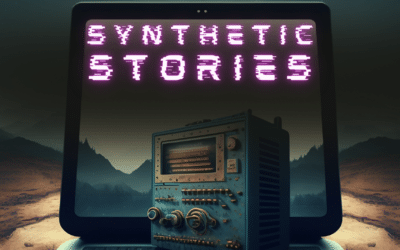So, this might be the single-most career-destroying thing I’ve ever done.
Like many, I’ve spent the last few weeks in awe of ChatGPT-4. I’ve been like a kid in a tech-filled sweet shop, putting the AI through its paces.
With a little tinkering, I created a virtual maths tutor for my daughter, tailored to her specific struggles in the run-up to her SATs. I even used it to design workshops for a couple of projects I’m running (I’m hoping they’re not reading this, BTW).
And after a bit of training, I’ve created a play-along game based on the classic teatime quiz Countdown, replete with virtual versions of Richard Whitely, Suzie Dent, Rachel Riley and everybody’s favour be-jumpered raconteur, Gyles Brandreth.
Oh, and I’ve got it to draft an email to an old telly industry mate in the style of an Elton John lyric (he’s the fan, not me).
But I think the biggest ‘jaw-drop’ moment came once I’d trained CGPT-4 with a series of documents and articles I’d written for publications over the years (including this one).
You see, I love writing. I love writing about business. I love writing about technology. And I love uncovering what makes my clients tick and turning that into words that capture their essence.
I love adding in a bit of Northern charm and a fair sprinkling of sideways (diagonal?) thinking to keep things engaging. And a story from my past that makes complexity relatable.
People seem to like it.
And I earn a living writing for clients or working with them on their business strategies, which involves bringing people onto the same page with clear, engaging ideas and plans to take them to where they want to be. So my writing style is critical to what my clients typically buy into.
After feeding the bot with five years worth of musings, I asked it to write an article about how Einstein’s theory of relativity relates to quantum physics in my style.
Here’s an excerpt: “…on the one hand, you’ve got Einstein’s relativity, which elegantly explains how space and time are intertwined, like a cosmic dance that affects everything from falling apples to swirling galaxies. But, on the other hand, you’ve got the weird and wonderful world of quantum physics, where particles can be in two places at once and cats can be both alive and dead (thanks, Schrödinger). These two theories might seem as compatible as a VHS tape in a Blu-ray player, but some bright sparks in the world of physics are working hard to reconcile them, hoping to create a grand, unified theory that’ll make sense of the universe’s quirks, both big and small…”
Yowsers. I then asked it (or ‘Higgins’ as ‘it’ was called by this point) to generate a prompt of my writing style. What came showed me just how powerful this is: a highly detailed, 10-point breakdown of how I write, from my tendency to use personal anecdotes and humour to how I often juxtapose seemingly unrelated concepts to drive a point home.
I don’t think I’ve ever been simultaneously chuffed and terrified so far in my existence, but blimey, I was then.
My mind zoomed. If an AI could capture the essence of how I write, does anyone need ‘me’ anymore? Surely, if they wanted a feature writing in my style, I could send them my prompt and have done with it? And where was this all heading…could I become the first ‘open-sourced’ copywriter?
I typed up a LinkedIn post to share the prompt, that I was happy for people to use my writing style in return for an attribution, just as you would if you used a Creative Commons piece of creative work. I didn’t necessarily want to give away my precious tone of voice for others to use; that’s possibly the worst business model I could think of. But I did want to stimulate a debate about what we do now that Pandora is, well and truly, out of the box.
Of course, what clients buy from me isn’t just about the words I use to articulate their business or strategy. It’s the time I spend digging around their work, asking questions and teasing out the essence of what they do and how they do it. I get paid to be nosey: if I’ve done all of the above correctly, putting pen to paper is the most straightforward bit of the task. On my LinkedIn post, someone reminded me of a strapline I’d created for a client, which feels spot on in the moment we find ourselves in, ‘Robots Code, Humans Reason.’
We’re entering into a new era professionally, and personally. Putting AI into the hands of the millions is, for me, the biggest tech advance since the internet’s arrival. I think it’s even more profound than that.
And yes, there are risks. We’re giving ourselves up to the dark overlords, placing more and more dependence on the technologies that increasingly drive our lives. Risks around bias, the sheer legality of approximating the work of others, and the risk of bad actors deploying their own AI frameworks that aren’t subject to the same controls that OpenAI or Google might adhere to.
But, as I said, Pandora’s out of the box, and in hot pursuit, there’s a glut of AI tools following.
We have to change our approach to work.
We can cower away and worry about our professional careers, or we can embrace, prompt and train AI to make our day-to-day workflows more efficient. We can start shaping what we do next by releasing the shackles of what’s come before. So what if people do want to use my cheeky Northern twang to write an article for their plumbing service:”When the Iron Throne is out of reach and your porcelain throne’s in peril, our expert plumbers swoop in like Daenerys’ dragons to unblock your loo and restore order in the realm of flushes.”
I’m doing this because I want to focus on how AI can change how businesses and organisations of all sizes work.
So, here we are at the crossroads of AI and creativity, where the future of work will be defined by how we adapt and integrate these powerful tools into our professional lives. I’m embracing this change, and every business in our sector should explore the opportunities, too.
If you’re intrigued by the potential of AI and want to learn how to make it work for you, or if you’re just curious about using my “open-source” writing style, get in touch via [email protected]. Let’s dive into this together and start shaping the future with the help of our AI assistants / overlords*. (*Delete as appropriate).
*Phil Birchenall is the founder of creative, digital and media industry consultancy Diagonal Thinking.












